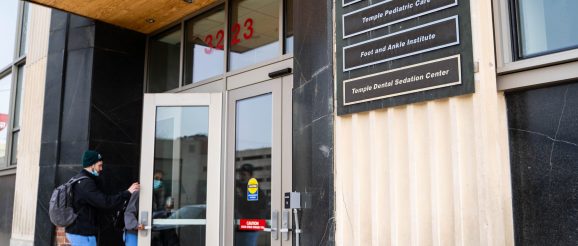Temple to start construction of Innovation Hub at Health Sciences Campus in Fall


Temple University expects to begin construction of the Health Sciences Campus’ new Innovation Hub in April or May, with plans to complete the $4.9 million project this fall, said Martin Droz interim associate vice president for the Project Delivery Group.
The center will be housed on the fourth floor of the Old Dental School, located on Broad Street near Allegheny Avenue, which was unused before the project. The hub will serve as a place for Temple to accelerate its own research and help grow companies they partner with, said Stephen Nappi, associate vice president for technology commercialization and business development.
“What the Innovation Hub will do is really enable us to create the first home for innovation at Temple, the first home for the commercialization team,” Nappi said.
The high ceilings and large windows give the Old Dental School an industrial look, making it the perfect place for the Innovation Hub, Droz said.
“It occupies the whole Broad Street side of the building, so you get views because it has a south-facing window,” Droz said. “You get views to Center City, you get views to the west part of the city and even to the northern part, so it’s a very lofty, expansive space.”
Similar to the Ritter Hall and Annex construction, Temple ordered materials for the Innovation Hub’s construction in March to account for global supply chain issues that could have slowed the process of receiving the shipment.
Construction will include demolishing the Old Dental School, removing partitions and equipment in the building and then installing new partitions and doors, Droz said.
Temple finished the design phase of the project in January, said Stephanie Chace, design project manager at the Health Sciences Campus. The phase included creating plans for business, lab and collaboration systems in the north, south and middle of the building.
In the north side of the building, the Hub will feature an office, wet lab, biosafety cabinets, fume hoods and computational space, Chace said.
Start-up companies can use the south side of the building — which will be called the executive level office — to hold meetings with investors, Chace said.
Between the north and south sides, there will be a forum where both ends of the building can collaborate. Investors can meet with the start-up companies, allowing them to collaborate and share ideas. There will also be a space to host conventions where start-up companies may present pitches to groups of investors.
The spaces are easily customizable, meaning when one startup no longer needs to use the area, another can personalize it to their brand, Chace said.
The Board of Trustees approved $3.5 million for the project’s construction fees at their meeting on March 15.
“We want this facility to get us onto the next to increase the innovation activity on campus, increase the startup activity resulting from that,” Nappi said. “Ultimately, our goal is to increase the number of products that we can get out there in the marketplace.”
Fallon Roth contributed reporting.
